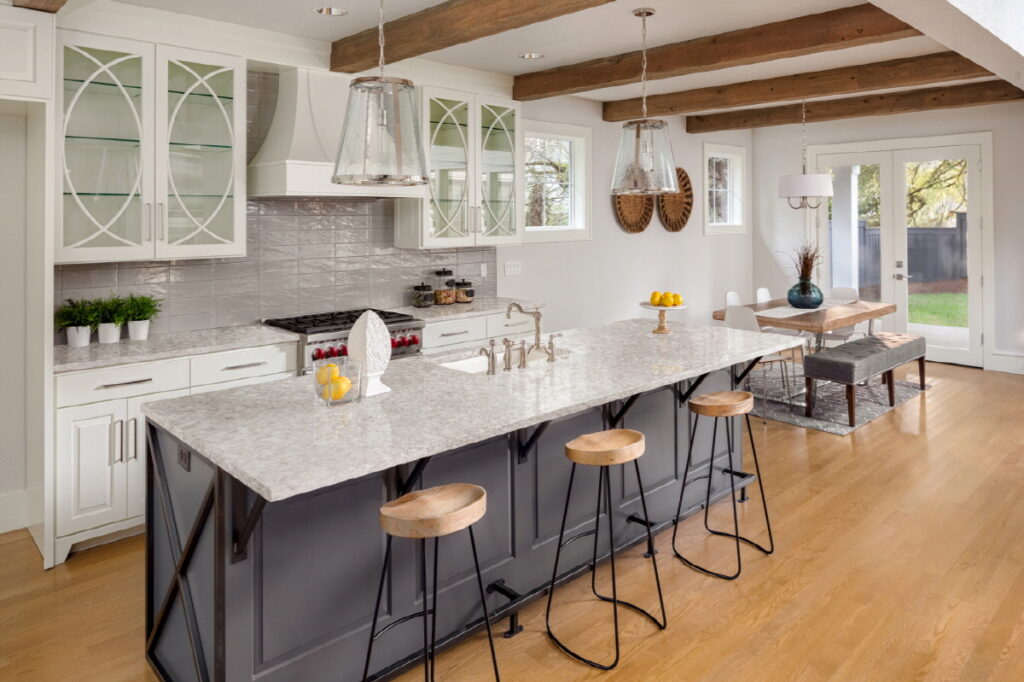Choosing greener counters is one way to add value to your home while doing your part for the environment. Many eco-friendly options are available, from reclaimed wood to recycled glass.
Sustainable countertops use materials harvested or produced locally. They reduce the consumption of fuel to truck in raw materials from distant places. They also reduce outgassing, which is beneficial for those with chemical sensitivities.
Granite
Granite comes straight from nature and requires little in the way of manufacturing to create a countertop slab. With the proper maintenance, it can withstand stains, moisture, and chemicals and last for many years.
One of the best options for environmentally friendly countertops Denver is terrazzo. This countertop material is a stylish choice that uses between 50 and 75% recycled materials. It is non-porous and heat-resistant and can be molded into various designs.
Another beautiful natural stone option is soapstone, which adds a rustic flair to your home and will look great with many different kitchen decor styles. This natural stone is incredibly easy to clean and resistant to bacteria, mold, and mildew. The only downside to this stone is that it may be costly and require professional installation.
Quartz
While concrete countertops are beautiful but not as eco-friendly as other options, creating concrete takes a lot of energy and can emit harmful volatile organic compounds. Concrete also requires a sealer containing toxic chemicals, which can affect your family’s health.
Quartz counters are made from natural materials that require less manufacturing than other counters. Plus, they’re non-porous, which reduces the amount of bacterial buildup in your home.
Another benefit of quartz is its extensive color choices, which can fit traditional and modern styles. This versatility is ideal for homeowners who want to create a custom look for their kitchen remodels. Compared to granite, quartz is more resilient to normal wear and tear. It’s also easy to maintain, making it an excellent choice for busy households.
Porcelain
If your goal is to use fewer raw materials in the construction of your townhouse, consider quartz countertops. Made of natural quartz and resin, this countertop material is a durable and attractive alternative that uses fewer raw materials than granite and other standard counters. It also requires far fewer replacements, reducing the rate at which new counters are discarded.
Another option is a solid surface like Durant. It combines marble dust and bauxite with acrylic or resin for a non-porous surface that resists heat, humidity, and chemicals.
Concrete isn’t wholly eco-friendly but can be made using recycled concrete and a low-VOC sealer that doesn’t emit harmful VOCs. Look for GFRC (glass fiber reinforced concrete), which uses significantly less cement and incorporates large amounts of recycled materials.
Recycled Glass
When it comes to eco-friendly kitchen countertops, glass is a surprising option. It is durable enough to withstand the rough treatment of a modern kitchen and looks just as good as other countertop materials.
You can make your glass counters even greener by choosing locally produced-materials for your project. That reduces the environmental footprint by eliminating the use of fuel to truck in materials from far away.
Another way to green up your glass counters is to recycle them. Check to see if your garbage pickup company accepts glass recyclables; if not, find out where you can donate them. Crafters and restaurants take discarded glass to create items like Mason jars, candle holders, and sculptured art. Some even turn it into upscale, modern countertop applications.
Tile
The counters in your Denver area home can significantly impact your life. They need to look good and provide a durable surface, and sustainability is essential to have minimal environmental impact during their lifetime.
For an eye-catching, eco-friendly option, consider recycled glass countertops. Lapitec, a composite of 85 percent recycled glass combined with bonding agents such as resin and cement, looks like marble and works well within transitional and modern design styles. However, it does stain if acidic products are not wiped up immediately.
Even concrete counters aren’t entirely green, Girard points out, since cement production uses a lot of energy and mining aggregate and sand can be environmentally disruptive. Ask your countertop fabricator if they use a green mix that reduces the amount of resource-intensive cement.

